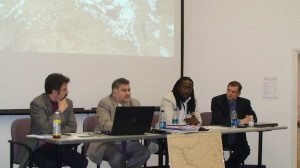
On May 15, a timely and fascinating panel discussion took place at George Mason University’s Institute for Conflict Analysis and Resolution in Arlington, Va. The topic of the panel was the viability and feasibility of Armenian Genocide reparations. Participating in the panel were Ara Papian, the former Armenian ambassador to Canada and an expert on treaty history and law, Jermaine McCalpin, a specialist in long-term justice and transitional justice, and Henry Theriault, a frequent contributor to the Armenian Weekly and specialist in the ethics of reparations for crimes against humanity. Serving as moderator was Dikran Kaligian, author of Armenian Organization and Ideology under Ottoman Rule, 1908-1914.
The panel was particularly relevant given the recent events that have taken place in Turkey and reported in the pages of the Armenian Weekly. Theriault and Khatchig Mouradian, the editor of the Armenian Weekly, traveled to Ankara, Turkey in April for a conference where much of the discussion was in regards to Armenian Genocide reparations. If those in Turkey have begun discussing the need for reparations, then it is past due that the discussion also begins in the Armenian Diaspora.
While one can see that a number of events over the past months have touched on reparations, this panel was the first to present such a detailed scholarly discussion of the topic. One of the goals of the panel was to introduce a preliminary report that had been prepared by the panelists, along with Alfred de Zayas, a former senior lawyer with the Office of the UN High Commissioner for Human Rights and Chief of Petitions, who was unable to attend the George Mason panel.
Theriault began by explaining that the group had been formed to be a proactive initiative to address, from a scholarly perspective, justice for the Armenian Genocide in light of the changing environment where denial has been marginalized. The group views this as a more effective way to engage the genocide as opposed to the flawed Armenia-Turkey protocols. While members of the study group differed on certain points, the report attempted to detail the various views while remaining a coherent document that accurately the areas of substantial agreement.
In a very poignant comment, Theriault pointed out how regardless of any reparations process, Armenians will still bear the greatest burden of the lingering impact of the Armenian Genocide.
Papian discussed reparations in the context of the diplomatic processes leading up to the Treaty of Sevres. Between 1918 and 1923, there were five treaties that defined Armenia-Turkey relations. Do these treaties supply the legal basis for Armenian territorial rights? Papian stated that only the Treaty of Sevres can be considered a legal treaty; for various reasons, the other four do not meet the international requirements to be considered treaties. However, it is the other forms of relations during that time period that further give national territorial rights to Armenians.
McCalpin discussed the theoretical concepts of truth and reconciliation commissions and what can be learned from the South African experience. He also dealt with the argument against reparations that, because so much time has passed in the Armenian case, the issue is no longer relevant; he responded that as long as there is intergenerational inheritance, we must also recognize intergenerational transfers of responsibility. In addition, he added important ideas about the complex nature of truth especially in the context of a denied history. He explained that there are four senses of truth for historical events: the dialogic, forensic, official, and historical. He said Armenians must be precise in their language—saying we are looking for conciliation and not reconciliation. Acknowledgement and remorse are only precursors to justice.
The panelists supplied not only the foundations for justifying reparations for the Armenian Genocide but also dealt critically with the political processes that have been implemented to date by those aiming to derail the movement for reparations.


Megha Asdvadzim….there was actually a conference on reparation in Ankara? Wow…we are entering rarefied air indeed!
Is the said report available online? Many of us outside the US would want to be kept informed about the deliberations regarding reparations and the foundations upon which the restoration campaign will be built. Can anyone of the involved comment if the Panel (academic) initiative at some point is to lead to political initiative?